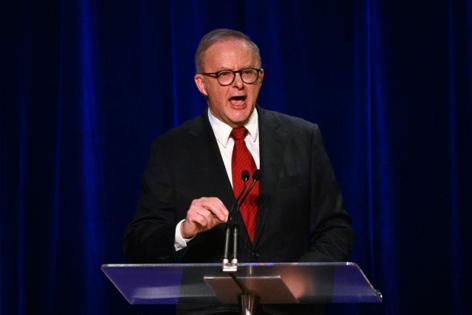Australia and Turkey at loggerheads over 2026 climate summit
Published in Science & Technology News
Australia and Turkey are vying to host the annual United Nations climate summit next year, a contest that on Thursday broke into full view at the current talks in Brazil.
Advocates supporting Australia’s bid mounted a news conference to make their case outside the country’s pavilion at COP30 — in an awkward twist, just steps away from Turkey’s location. As workers in the Turkish pavilion began handing out coffee and tea to delegates Thursday morning, First Nations Australians performed a cultural dance.
Australia has a unique opportunity “to be a decarbonizing force for the whole region and indeed the world,” said Rebecca Mikula-Wright, chief executive officer of the Investor Group on Climate Change, a network of institutional investors in Australia and New Zealand.
At issue is which country will lead high-level international climate negotiations in 2026 and stage a conference that typically summons tens of thousands of delegates from around the world as well as significant green investment. Host countries also secure a rare opportunity to showcase their climate policies, economies and culture to the world while luring tourist dollars and trade.
Neither Turkey nor Australia is so far willing to concede, and nations tasked with working out the dispute haven’t come to a decision in a process that requires consensus. Possible outcomes could see the conference land in Adelaide, Australia, or Antalya, Turkey.
If no decision is reached by the end of the ongoing COP30 summit, Germany would host by default, as it is the host of the U.N. Framework Convention on Climate Change secretariat.
Australia Prime Minister Anthony Albanese said Thursday he’d received a letter from Turkey President Recep Tayyip Erdogan within the past 24 hours “maintaining his position in response to Australia maintaining our position.” Bilateral negotiations are expected to continue next week after ministers arrive in Belem.
Supporters of holding the conference in Australia say it would keep the spotlight on Indigenous peoples while highlighting the Asia-Pacific region and island states bearing the brunt of climate change.
It would also demonstrate the region is a stable, secure and dynamic place to invest in the energy transition, said Paul Hunyor, CEO of Wollemi Capital, an investment firm focused on the energy transition and emerging infrastructure. “Australia has the fourth-largest pool of asset-fund pension capital in the world,” Hunyor said. “What you will see highlighted is that it is mobilizing at pace to finance turning Australia into a renewable energy superpower.”
Three years ago, when Australia first entered the ring, its bid to host COP31 alongside Pacific island nations looked like a done deal. But Erdogan said at COP29 last year that his country, which is targeting net zero by 2053, would also bid for the 2026 summit.
Negotiators from Australia had hoped Turkey would concede after Albanese won a second term in May, keeping a climate-friendly leader in power. But instead Turkey doubled down. At June’s preliminary COP30 talks in Bonn, Germany, Turkey’s chief negotiator launched a glitzy presentation showcasing the coastal city of Antalya and emphasizing the country’s role as a bridge between global regions.
Recent U.N. climate summits have been held in Egypt, the United Arab Emirates and Azerbaijan.
“There has never been a Conference of the Parties held in the Pacific. Our neighbors, as well as Australia, think it is time that it was held in this region,” Albanese told reporters Thursday, adding that “Pacific countries like Tuvalu and Kiribati are literally under threat — their very existence” at risk.
Longtime negotiators and activists say holding the conference in Oceania would amplify the voices of small island nations on the front lines of climate change. That could potentially help drive a more progressive outcome, including more aggressive commitments to jettison fossil fuels — a concern for oil-producing heavyweights in the Middle East.
Refereeing the dispute is a bloc of nations known as the Western Europe and Others group, a mismatch of countries including the U.K., Germany and France as well Australia, Canada and New Zealand. Although Australian officials believe they’ve secured the bulk of support, the hosting decision requires consensus within the group.
In order to break the deadlock, COP30 host Brazil has appointed the country’s climate secretary, Mauricio Lyrio, and Azerbaijan’s lead negotiator Yalchin Rafiyev to consult with both sides. A number of options have been floated, including a co-presidency, or Turkey potentially hosting the connected climate summit for world leaders.
Australia is a major fossil fuel exporter and among the biggest per-capita emitters. But Albanese has sought to reverse Australia’s previous reputation as a climate laggard, legislating the country’s first binding emissions reduction target shortly after coming to power. A new goal announced in September seeks cuts of between 62% to 70% on 2005 levels by 2035.
On Thursday the country’s Liberal Party, the main opposition to Albanese’s governing Labor Party, dropped a commitment to hit net zero emissions by 2050.
©2025 Bloomberg L.P. Visit bloomberg.com. Distributed by Tribune Content Agency, LLC.







Comments